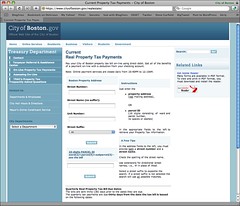Many real estate investors are well aware of the passive loss rules, and the importance of being “active” under these rules in order to take tax losses that can occur due to depreciation and interest write-offs exceeding net rent income.
Many, however, are not aware of the big impact that passive vs. active structures can have on estate tax payment plans and the 3.8% Medicare tax on investment income that will take effect January 1, 2013.
Under the new 3.8% Medicare tax, a passive investor’s net rent income (rent income minus expenses minus depreciation and interest write-offs), if positive, will be subject to the 3.8% Medicare tax if the $200,000/single taxpayer or $250,000/married filing jointly taxpayers hurdle is cleared.
| City of Boston Real Property Tax Payments Page (Photo credit: stevegarfield) |
The Medicare tax can be avoided if the rental income is “active”, and it is the “passive income rules” referred to above which decide whether the taxpayer is active or passive.
Triple net leasing will not be active unless the taxpayer qualifies as a real estate professional.
In fact the most surefire ways of making sure that investments are active is to meet the requirements for a real estate professional (spending at least 750 hours per year materially participating in real estate activities and having real estate activities be over 50% of your total trade and business activities).
Rental income can potentially be considered a non-passive activity if you lived on the property for more than 14 days or at least 10% of the time that the property was available for rental. A second home or vacation home that is rented out the rest of the year might therefore qualify as a non-passive activity.
In addition, individuals who die and are subject to federal estate tax can obtain an automatic payment plan to the extent that the tax is attributable to actively managed real estate businesses. Triple net leased real estate will not qualify as being actively managed, so many older taxpayers are encouraged to have their real estate endeavors be actively managed, which will now have twin purposes with the 3.8% Medicare tax discussion described above.
Payment plans are permitted where more than 35% of an estate consists of “closely held business interests”, which can include actively managed real estate. Closely held business interests CAN qualify if the estate of the decedents owns 20% of more in ownership interests of the trade, business, or stock thereof and there are 45 or fewer owners of the trade or business. The payment terms are very advantageous—-interest only at 2% on the first $1,000,000 (adjusted for inflation). For 2012, there is a maximum of $486,500 in deferrable tax that would BE SUBJECT TO interest at the 2% rate. The tax owed on the rest of the estate over $1,000,000 is taxed at 45% of the standard tax underpayment tax RATE, which is currently 1.35% BUT WILL GO UP WITH MARKET INTEREST RATES. Any late payments will be taxed at the 3% standard underpayment rate.
These interest-only payments can be made for the FIRST four years. In the fifth year the tax is amortized, and interest is due as well as a payment on the principal of the tax owed. Payment plans can be spread out over a maximum of 10 years at these interest rates, making the entire balance of the tax due 1 YEAR later. No collateral is necessary for this payment plan, which is made by providing a 6166 Notice of Election with a filed tax return within six months of the return due date. Filing a 6166 Notice of Election along with an extension to file will not be considered valid.
All of the above and more is explained in the new book entitled The Annihilation of Wealth. This book is written by well-known tax lawyers Alan S. Gassman, and Eric G. Pless, and is available on Amazon and Smashwords by hard copy or electronically for $24.95.Click HERE to purchase.

The book goes into significant detail on all aspects of what will happen in 2013 under the present tax law, and gives dozens of planning ideas while identifying traps for the unwary and helping to show how the budget for increased taxes.
By Brad Thomas
Brad Thomas is a regular contributor to Forbes and he has over 25 years of experience in commercial real estate. He has a South Carolina real estate license and he is a well known writer, speaker, and author on the topic of REIT investing. Each taxpayer should seek advice from an independent tax advisor with respect to any Federal tax issue(s), transaction(s) or matter(s) addressed, discussed or referenced herein based upon his, her or its particular circumstances.
Taken from: http://www.forbes.com/sites/bradthomas/2012/09/25/the-annihilation-of-wealth-do-you-actively-manage-your-investment-real-estate






No comments:
Post a Comment